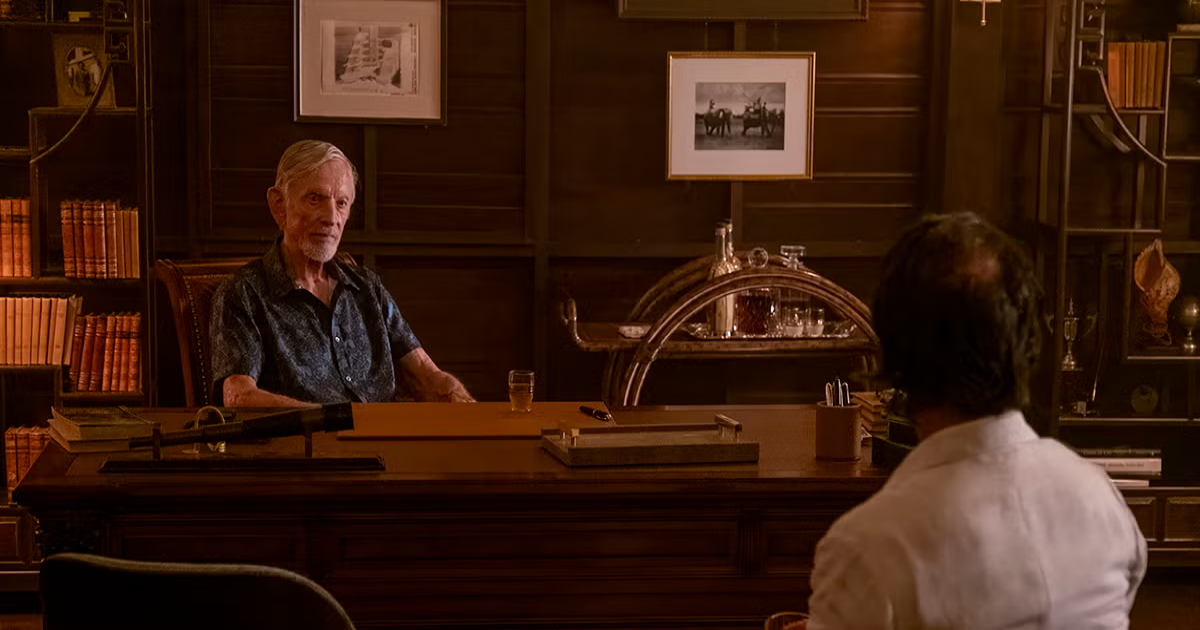
Fabio Lovino/HBO
Scott Glenn has had a long and storied career. The former newspaper reporter and Marine has been an invaluable player in projects from Apocalypse Now to Urban Cowboy, The Silence of the Lambs, The Virgin Suicides, and the Jason Bourne movies. But when it came to his 11th-hour surprise appearance in the fourth season of The White Lotus, he says the HBO show offers “something… I had never really seen before.”
At the end of the season’s sixth episode, characters played by Walton Goggins and Sam Rockwell show up at the home of erstwhile actress Sritala Hollinger (Patravadi Mejudhon), the wife of the titular hotel’s owner, to trick her into thinking she’s being offered a part in a film. Really, Goggins’s character is there to find her husband (Glenn), who he believes killed his father. Glenn doesn’t appear on camera in the episode, but his unmistakable voice is the last thing audiences heard before it ended. Now, in this week’s seventh episode, he makes an unforgettable turn as Jim Hollinger, an American expat living in Thailand whose checkered past just might be about to catch up with him.
 Fabio Lovino/HBO
Fabio Lovino/HBO
Patravadi Mejudhon and Scott Glenn play the married couple who own the titular hotel on The White Lotus.
Here, the actor speaks to T&C from his Idaho home about what drew him to the series, how he found the rhythm of Thailand with a little help from Marlon Brando, and why even the death and disaster of The White Lotus won’t keep him away from five-star hotels.
How did you land the part of Jim Hollinger?
My agent said that The White Lotus had called asking for my availability, and he said, “If they offer you anything on this show, I want you to do it because there’s no other show on television that has this kind of an obsessive audience.” But I’m one of the world’s worst audience members; aside from sports and news, I don’t watch much TV at all, so I had never seen it. They sent me a description of the character that I did not like. I thought, oh, not another old guy who’s ill with a cane, but he’s still sharp—that sounds like five of the last parts that I was offered and turned down for that fucking reason. But I’ll watch the show anyway. So, that night I watched episode one of season one and was instantly seduced by it and realized that I was watching something that, in terms of its construction, I had never really seen before. I wanted to be a part of it.
I hope you found something in the character beyond that initial read?
My character is in a different situation than anybody else on the show; they’re either employees or guests at the White Lotus, and at the end of the week they’re going to go home. I own the White Lotus —arguably I named it the White Lotus—and I’ve lived in Thailand off and on for 60 years. I’m married to a Thai woman and have two Thai daughters, and the idea of doing that kind of research turned me on. That’s what sucked me in and gave me an excuse to learn stuff that would be fun to learn anyway.

Scott Glenn’s career has taken him from films like Apocalypse Now and Urban Cowboy (above) to the latest season of The White Lotus.
What did you learn?
I had been in Thailand before, and I know Thailand fairly well. The only hard part about working in Thailand on this show was the way it was shot—I would work maybe two days and then be off for two or three weeks, so it was a lot of back and forth. That was the hard part. But it gave me an excuse to learn more about Thailand and Thai Buddhism; if I named it the White Lotus, why would I do that? Because the lotus in Thai Buddhism is a primary symbol, and the white lotus is the most special, [it signifies] mental purity and spiritual perfection. I got over there and started learning very basic martial arts, one called Krabi-Krabong, which is a kind of dance with two 20 to 23-inch sword and the other was Muy Thai.
Does learning that help you find the character?
I learned this from Marlon Brando years ago: He said, “If you want to learn an accent, before you start playing around with the pronunciation of words, learn that every country has a rhythm. Find that rhythm and you’ll be believable.” I thought if I do those things, I can begin to pick up on what the rhythm of Thailand is, and hopefully it’ll seep into the character that I’m playing.
You said earlier that there were characters you had turned down that felt similar in a way that you weren’t interested in. What’s the sort of thing you can be offered that really piques your interest?
Something that surprises me, something that’s original, something that doesn’t feel like it’s stereotypical, something that has the potential for humor. If it’s not a good answer to your question, but it is my answer.
“My character is in a different situation than anybody else on the show; they’re either employees or guests at the White Lotus, and at the end of the week they’re going to go home.”
What would you say to people who are anticipating the upcoming final episode of the season?
What happens on The White Lotus in every season and in every episode is that you bounce back and forth between the stories of guests and employees. There may be seven or eight storylines, and all of the people involved are facing life-changing events. It’s almost like the show is like a pinball game and the audience’s attention is the ball. At the end of the whole thing, there’s an answer to each life-changing situation in each storyline. I have my own life-changing situation.
No kidding. At the end of episode seven, you’ve just had a shocking experience. Does playing out this kind of drama make you think twice about staying at fancy resorts?
No! Part of the hook of doing The White Lotus is that you get to stay in a hotel. When I went to Thailand, I asked, “How long, when I’m done shooting, can I stay?” Mike said, “When you’re done shooting, if you want to stay here, just stay here. We’ll pick up the tab.” Given the places we stay, the Four Seasons especially, I’m ready to do another one. What I’m not ready to do is swipe my own credit card and pay the bill.

Deputy Features Director
Adam Rathe is Town & Country’s Deputy Features Director, covering film, theater, books, travel, art, philanthropy, and a range of other subjects.
